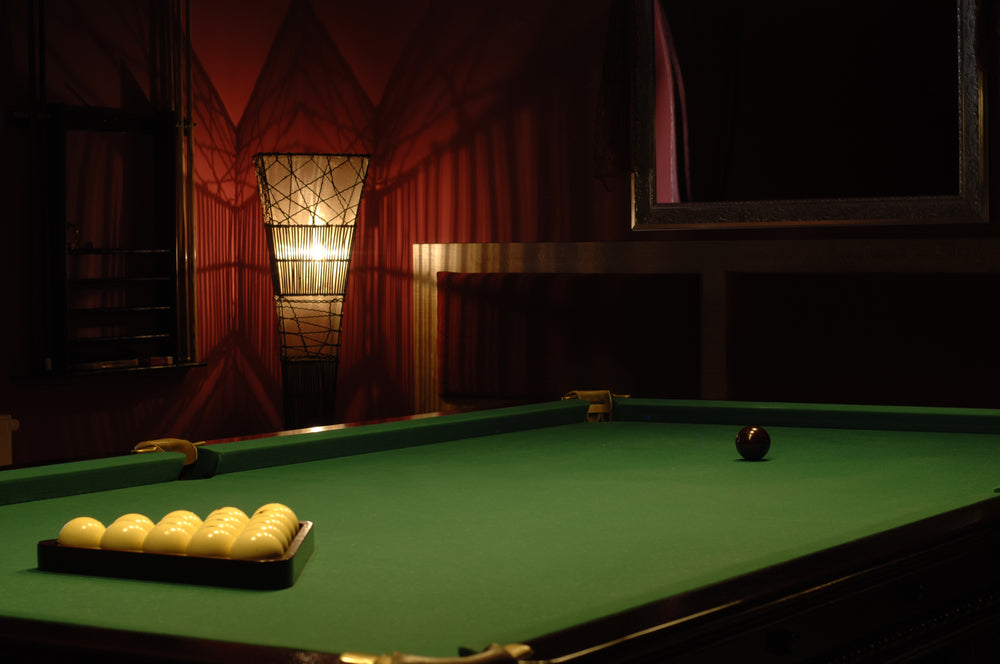Beyond the Green Felt: Diving into the Diverse World of Cue Sports
You think you know billiards, pool, and snooker, but let me tell you, my friend, there's more to it than meets the eye.
These games may seem similar, but they have distinct differences that set them apart.
From the origins and history to the table size and equipment, each game brings its own unique challenges and strategies.
In this article, we'll dive deep into the world of outdoor billiard table, home pool table, and snooker, unraveling the mysteries and helping you become a true master of the cue.
Are you planning to host a game night? Here are some strategies to transform your outdoor pool table into a competitive arena.
Origins and History
In this article, you'll learn about the origins and history of billiards, pool, and snooker.
These three cue sports have rich and fascinating backgrounds that have contributed to their popularity and enduring legacy.
The origins of billiards can be traced back to as early as the 15th century in Europe.
It evolved from a lawn game similar to croquet, where players used a mace to hit balls through hoops.
Over time, the game moved indoors and the mace was replaced with a cue stick.
The term 'billiards' itself is derived from the French word 'billart,' which means 'wooden stick.'
Pool, on the other hand, emerged in the late 18th century as a variation of billiards.
It gained popularity in the United States, particularly among the working class.
The game was played on smaller tables and featured pockets, which added a new level of strategy and skill.
As the game spread across America, various rule sets and variations developed, leading to different types of pool games such as eight-ball, nine-ball, and straight pool.
Snooker, the youngest of the three cue sports, was invented in the late 19th century by British Army officers stationed in India.
The game was named after a derogatory term for inexperienced cadets, as they often missed easy shots.
Snooker quickly gained popularity in the United Kingdom and eventually spread worldwide, becoming particularly prominent in countries like India, China, and Australia.
Understanding the origins and history of billiards, pool, and snooker provides valuable insights into their unique characteristics and rules.
Whether you prefer the precision of billiards, the strategy of pool, or the complexity of snooker, each game offers its own challenges and rewards.
Table Size and Equipment
To fully understand the differences between billiards, pool, and snooker, you'll need to familiarize yourself with the table sizes and equipment used in each game.
Let's start with the billiards table vs. pool table.
Billiards tables like the American Heritage Billiards Table are larger than pool tables like the Playcraft pool table, measuring 10 feet in length.
They've no pockets and are typically used for carom games, where players use a cue ball to strike the object balls and score points by making them contact each other.
On the other hand, pool tables are smaller, usually measuring 7, 8, or 9 feet in length.
They've six pockets, one at each corner and one at the midpoint of each long side.
Pool is typically played with 15 object balls and a cue ball.
The objective is to pocket the object balls in a specific order and accumulate the most points.
Now, let's move on to the snooker table vs. pool table.
Snooker tables are even larger than billiards tables, measuring 12 feet in length.
They've smaller pockets and are played with 21 object balls, including 15 red balls, 6 colored balls, and a cue ball.
The objective in snooker is to pocket the red balls, followed by the colored balls while accumulating the highest score possible.
In terms of equipment, all three games use cues and balls, but the sizes and materials may vary.
Billiards and pool cues are typically shorter and heavier, while snooker cues are longer and lighter.
The balls used in billiards are larger and have no numbers, while pool and snooker balls are smaller and have numbers to distinguish them.
Understanding the differences in table sizes and equipment is crucial to mastering each game.
Now that you're familiar with the basics, let's delve into the game's objectives and rules.
Game Objectives and Rules
Before diving into the game objectives and rules, let's take a closer look at each game's unique characteristics and how they affect gameplay.
Pool, billiards, and snooker are all cue sports played on a table with pockets, but each game has its own set of objectives and rules.
In pool, the objective is to pocket all of your designated balls (stripes or solids) and then sink the 8-ball to win the game.
The player who pots the 8-ball before their opponent is the winner.
Pool is known for its strategic play and requires a combination of skill, precision, and strategy when playing on a Vision Outdoor Pool Table.
Billiards, on the other hand, is a more general term that encompasses a variety of cue sports.
In billiards, the objective is to score points by pocketing balls with the cue ball while playing on an American Heritage Victory 8ft Billiard Table.
There are different variations of billiards, such as straight pool and three-cushion billiards, each with its own specific rules and objectives.
Snooker, a game that originated in the British Empire, is played on a larger table with smaller pockets.
The objective is to score more points than your opponent by potting the red balls, followed by colored balls.
Snooker requires a high level of skill and precision, as players must alternate between potting red balls and colored balls, in a specific order.
Understanding the game objectives and rules of pool, billiards, and snooker is crucial to becoming a skilled player in these cue sports.
Now that you have a grasp of the game objectives and rules, let's explore the different types of shots and techniques used in these games.
Types of Shots and Techniques
Now that you understand the game objectives and rules, let's explore some of the different types of shots and techniques you can use in pool, billiards, and snooker.
Each of these games has its own unique set of strategies and skills, so it's important to understand the differences.
In billiards, the focus is on precision and control.
Here are some common types of shots and techniques you can use:
Draw shot
This is when you hit the cue ball below its center to make it reverse its direction after hitting the object ball.
This shot is often used to position the cue ball for the next shot.
Bank shot
A bank shot involves hitting the object ball off the cushion to pocket another ball.
This technique requires careful calculation of angles and speed.
Combination shot
This shot involves hitting one ball into another to pocket it.
It requires precise aim and timing.
In pool, the emphasis is on strategy and shot selection while playing on a Vision Billiards Sydney Pool Table.
Here are some types of shots and techniques commonly used in pool:
English shot
This is when you apply side spin to the cue ball to make it curve.
It's often used to control the position of the cue ball after it hits an object ball.
Carom shot
A carom shot is when you hit an object ball into another ball, without pocketing any balls.
This shot is frequently used to set up the next shot.
Jump shot
A jump shot involves making the cue ball jump over an obstructing ball to hit an object ball.
It requires skillful execution and precise aim.
In snooker, the focus is on finesse and strategy.
Here are some types of shots and techniques commonly used in snooker:
Screw shot
This is when you hit the cue ball low and with a backspin, causing it to stop or even reverse its direction after hitting an object ball.
It's often used to control the position of the cue ball.
Potted ball
This is the act of pocketing a ball.
Snooker requires precise potting to accumulate points and secure victory.
Safety shot
A safety shot is when you play defensively, focusing on leaving the cue ball in a difficult position for your opponent.
The goal is to limit their options and force an error.
Understanding the differences between these games and the various types of shots and techniques used in each can greatly enhance your skills and enjoyment.
So, practice these techniques and experiment with different shots to become a master of billiards, pool, and snooker.
Scoring and Point Systems
If you're wondering how scoring and point systems differ in billiards, pool, and snooker, let's break it down for you.
Each of these games has its own unique scoring system, adding to the complexity and strategy involved in playing.
In billiards, the scoring is relatively simple.
The objective is to score points by pocketing balls, with each ball having a designated value.
The player who reaches a predetermined point total first wins the game.
Pool, on the other hand, has different variations, each with its own scoring system.
The most popular version, Eight-Ball, involves pocketing balls numbered one through seven, along with a solid or striped group, and the eight ball.
Players earn points by pocketing balls from their designated group, and the game ends when one player legally sinks the eight ball while playing on a Playcraft Brazos River Slate Pool Table.
Snooker, a game that originated in British colonies, has a more intricate scoring system.
The objective is to pocket red balls and alternate between potting a red and a colored ball.
Each colored ball has a specific point value, ranging from two to seven. In addition, players can earn extra points through fouls committed by their opponents.
The game ends when all the balls have been pocketed, and the player with the highest point total wins.
Understanding the scoring and point systems in billiards, pool, and snooker is crucial for mastering these games.
Each game offers a unique challenge and requires players to strategize and make precise shots to maximize their point totals.
So, whether you prefer the simplicity of billiards, the versatility of pool, or the complexity of snooker, knowing the scoring systems will enhance your gameplay and give you an edge over your opponents.
Popular Variations and Game Formats
For a more diverse and exciting experience, try playing different variations and game formats of billiards, pool, and snooker.
Each game offers its own unique set of rules and challenges, providing endless opportunities for players to showcase their skills and strategy.
Here are some popular variations and game formats to explore:
Eight-Ball
This is perhaps the most well-known and widely played pool game.
It's typically played on a billiards or pool table with 16 balls, including one cue ball, seven striped balls, seven solid-colored balls, and the black 8-ball.
The objective is to pocket all of your designated balls and then legally sink the 8-ball to win the game.
Nine-Ball
In this fast-paced variation, players must pocket the balls in numerical order, starting with the 1-ball.
The twist is that the balls aren't re-racked after each pocket, so players must strategically plan their shots to ensure they have a clear path to the next ball.
The player who legally sinks the 9-ball wins the game.
Snooker
Unlike billiards and pool, snooker is played on a larger snooker table with smaller pockets.
It's played with 21 balls, including 15 red balls, 6 colored balls, and one cue ball.
The objective is to pocket the red balls and then the colored balls in a specific order, earning points for each ball pocketed.
The player with the most points at the end of the game wins.
By exploring these different variations and game formats, you can expand your skills and knowledge of the game.
Understanding the differences between billiards vs pool table, snooker table vs billiard table, and the difference between pool and billiards will help you navigate the various rules and strategies.
Now, let's dive into the world of notable players and tournaments to further enhance your understanding of these captivating sports.
Notable Players and Tournaments
As you explore the world of billiards, pool, and snooker, you'll discover a variety of notable players and tournaments that have shaped the history and popularity of these captivating sports.
In the world of snooker, one of the most renowned players is Ronnie O'Sullivan.
With his exceptional skill and natural talent, O'Sullivan has dominated the snooker scene for years, earning multiple World Championship titles and setting numerous records.
His precise cue ball control and ability to make difficult shots with ease have made him a true legend in the sport.
On the other hand, when it comes to pool, Efren Reyes is a name that can't be overlooked.
Known as 'The Magician,' Reyes has amazed audiences with his incredible shot-making ability and strategic play.
With numerous world titles to his name, Reyes has proved himself to be one of the greatest pool players of all time.
His unique style and ability to perform seemingly impossible shots have made him a fan favorite.
In terms of tournaments, snooker has the World Snooker Championship, which is considered the most prestigious event in the sport.
Held annually since 1927, this tournament attracts top players from around the world who compete for the coveted title.
The Crucible Theatre in Sheffield, England, serves as the iconic venue for this championship, adding to its allure and tradition.
Pool, on the other hand, has several notable tournaments, including the Mosconi Cup, which is a team event featuring the best players from Europe and the United States.
This intense competition showcases the skill and competitiveness of the players, making it a must-watch event for pool enthusiasts.
While there are differences between snooker and pool, both sports boast a rich history and have produced remarkable players and tournaments.
Whether you prefer the precision and strategy of snooker or the fast-paced excitement of pool, there's no denying the impact these sports have had on the world of cue sports.
Frequently Asked Questions
What Are Some Common Strategies and Tactics Used in Billiards, Pool, and Snooker?
In billiards, pool, and snooker, common strategies and tactics are crucial to master.
These games require precision and careful planning.
Players often focus on positioning the cue ball to set up their next shot, using angles and spin to control the trajectory of the balls.
They strategically aim to pocket specific balls or set up difficult shots for their opponents.
Additionally, players must strategically utilize safety shots to play defensively and gain an advantage.
These strategies and tactics elevate the gameplay and showcase the skill and intellect of the players.
Are There Any Specific Etiquette or Sportsmanship Rules That Players Should Follow While Playing These Games?
When playing billiards, pool, or snooker, it's important to follow specific etiquette and sportsmanship rules.
These rules ensure fair play and create a respectful environment.
Simple gestures like shaking hands before and after a game, refraining from distracting opponents, and maintaining a calm demeanor are all part of good sportsmanship.
Additionally, respecting the equipment and the playing area, waiting your turn, and refraining from cheating are important aspects of etiquette.
Following these guidelines will enhance your playing experience and show respect for your fellow players.
Can You Provide Any Tips for Beginners Looking to Improve Their Skills in Billiards, Pool, or Snooker?
Looking to improve your skills in billiards, pool, or snooker?
Here are some helpful tips.
First, focus on mastering the basic techniques, such as your stance, grip, and stroke. Practice regularly to build consistency and accuracy.
Additionally, study the game strategies and learn from experienced players.
Watching instructional videos or taking lessons can also provide valuable insights.
Lastly, remember to stay patient and persistent, as skill development takes time.
Keep practicing and you'll see improvement in no time.
Are There Any Health Benefits Associated With Playing Billiards, Pool, or Snooker?
Playing billiards, pool, or snooker can offer numerous health benefits.
Not only do these games improve your hand-eye coordination, but they also require strategic thinking and mental focus.
The physical movements involved, such as bending, stretching, and aiming, can enhance flexibility and muscle strength.
Additionally, the social aspect of playing with others can contribute to improved mood and overall well-being.
Are There Any Cultural or Regional Differences in the Way Billiards, Pool, and Snooker Are Played or Perceived?
Are there any cultural or regional differences in the way billiards, pool, and snooker are played or perceived?
Absolutely! Different regions have their own variations and preferences when it comes to these games.
For example, in the United States, the pool is more popular, with its own set of rules and terminology.
In the United Kingdom, snooker is highly regarded and has a strong following.
These cultural and regional differences bring unique playing styles, strategies, and even equipment preferences to each game.
Conclusion
Congratulations! You have now become a master of the cue!
With your newfound knowledge of the differences between billiards, pool, and snooker, you can now impress your friends with your expertise.
Just like a skilled player sinking a difficult shot, you have navigated through the intricacies and complexities of these games.
So go forth and conquer the felt, my friend, and may your cue always be steady and your victories aplenty!





